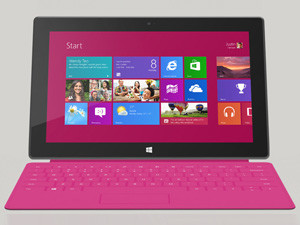
Windows RT, the tablet version of Microsoft's new Windows line-up and the OS hoped to launch Redmond bodily into the tablet space, may already be in desperate trouble. OEM support has waned, sales are poor, and its bigger brother - Windows 8 Pro - may deliver the final death blow in person.
Windows RT is the tablet-specific version of Windows 8, launched in October 2012, running exclusively on devices powered by ARM processors and supporting only newly-offered apps built for the device - it lacks the ability to run most current ("legacy") Windows applications. The more powerful Windows 8 Pro for tablets is not yet available, but will run on a new generation of Intel chips.
OEMs appear to be abandoning the RT ship left and right. Early in the cycle, there were concerns at Microsoft's plans to launch its own tablets, fearing it could deter partners from supporting the platform.
Microsoft, in turn, was between a rock and a hard place - if it did not launch its own product, and support was poor, it could be left with nothing in the game at all.
HP and Toshiba have already nixed plans to offer Windows RT-based devices. Acer has delayed its RT line-up, hedging its bets. And now Samsung, a major player whose support would add greatly to Microsoft chances, has said it will not ship Windows RT products to the US, citing weak demand.
Samsung's pronouncement was a body blow for Microsoft, not just because of its strategic impact, but also its timing: the news broke at the Consumer Electronics Show just days after Microsoft CEO Steve Ballmer took to the stage in a keynote cameo, showed off Samsung's Windows RT device, and touted the Korean company as a key strategic partner. That had to hurt.
That leaves Asus, Lenovo, Dell and Microsoft as the only vendors currently shipping Windows RT devices, and sales figures across the board are reportedly not looking encouraging. Microsoft's own tablet, with slick design and holding a price advantage as well, is doing the best. "Best" is relative, though: UBS analyst Paul Thill lowered his Surface RT sales expectations for the holiday season to half his previous estimates - just one million units sold.
Identity crisis
The risk of confusion between versions has troubled many. Samsung's remarks that a great deal of education had to be done around Windows RT may have been aimed at exactly this issue. Windows RT, although it looks and feels very much like Windows 8, is NOT Windows 8. Customers expecting their favourite applications to install and run could be disappointed to find that the ARM-only, app-only version is more limited than the netbook-only Windows 7 Starter Edition.
Similar confusion does not plague Apple. iPads don't run OSX desktop applications, and no one expects them to, but iOS and OSX are very clearly different beasts, designed and marketed for separate uses. Microsoft's laser-like focus on promoting Windows 8 as a ubiquitous environment may have done Windows RT more harm than good. Or has it?
Perhaps RT was only ever a temporary ploy - a holding strategy. Windows RT brought Microsoft into the tablet market and bought it some time until the new, Intel-based Windows 8 Pro tablets were ready. The ARM app ecosystem is not much concern - Windows Phone 8 is part of the same family and the development community has potential to thrive regardless of what happens to RT (Windows RT can't run desktop applications, but phones, tablets and desktops can all run apps). The Surface's design and build has been widely lauded, proving that Microsoft can deliver an attractive package in the highly competitive tablet market. Models running Windows 8 Pro could not only address the RT concerns, but learn from its launch experience as well, leaving Microsoft with a stronger offering and, perhaps, phasing out the previous version through a standard lifecycle rev.
Windows 8 Pro tablets, however, are expected to come with hefty price tags. The Surface RT starts at $499, in line with iPad pricing. The Surface with Windows 8 Pro is expected to start at $899 for an entry-spec version, more expensive than even the most feature-packed iPad available. Will consumers stump up nearly double the price of an iPad or top-specced Android tablet?
Leaving the mid-price bracket vacant would be hugely risky - it seems more likely that Windows RT should be left occupying that slot until its air supply truly does run out, and maybe it will even garner enough support (and break through the confusion and concerns) to establish itself as a successful niche player. Despite its limitations, Windows RT does have tangible value propositions, provided the buyers' expectations are managed.
At the high end, Microsoft may be counting on wooing the enterprise market. Even Windows RT bundles (some) Office apps, and Windows 8 Pro, with its consistent interface across computing platforms and tight integration with Microsoft's systems management tools, has a solid argument to make in corporate environments. It's a gamble whether the BYOD wave will yield to pressure by IT management - a gamble RIM will be making as well. Windows 8 Pro has a definite chance. Windows RT, on the other hand, needs a lucky break.
Share